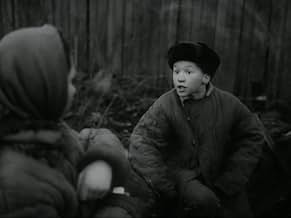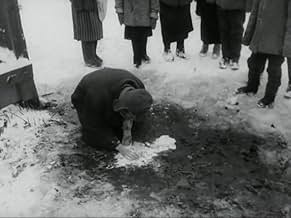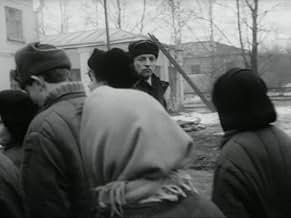Dos niños que viven en un remoto pueblo minero en los lejanos páramos de Siberia en 1947, sobreviven a la pobreza y las dificultades gracias a la calidez de su amistad y a un sentido del hum... Leer todoDos niños que viven en un remoto pueblo minero en los lejanos páramos de Siberia en 1947, sobreviven a la pobreza y las dificultades gracias a la calidez de su amistad y a un sentido del humor compartido.Dos niños que viven en un remoto pueblo minero en los lejanos páramos de Siberia en 1947, sobreviven a la pobreza y las dificultades gracias a la calidez de su amistad y a un sentido del humor compartido.
- Premios
- 7 premios ganados y 6 nominaciones en total
- Dirección
- Guionista
- Todo el elenco y el equipo
- Producción, taquilla y más en IMDbPro
Opiniones destacadas
The unusual title (never explained) is supposedly the name of a popular Russian children's game, but the only contest being waged in this remote town on the far eastern edge of Soviet Asia is called survival, and it's clear there aren't too many winners. One of the more exciting Soviet imports in quite a while is also one of the more depressing films ever made, presenting a tough and totally unsentimental depiction of childhood as seen through the eyes of a rebellious schoolboy and the level-headed young girl with whom he develops an antagonistic friendship. There's a strong documentary flavor to the episodic storyline and grainy black and white photography, and writer director Vitaly Kanevsky devotes equal time to the conditions which shape their fate (note the subtle but unmistakable condemnation of Stalinism recurring throughout). In effect the film is more of a mood piece, with the environment itself (ice, mud and manure) becoming the primary character. It's not always an easy film to watch or understand, but the effort can make it a rewarding experience.
Don't come to this expecting much in the way of a plot; it's a bunch of interconnected anecdotes about a boy living in a stark Siberian mining town. Apparently it's semi-autobiographical & filmed on a minuscule budget. Some online reviews claim the boy's mother is a prostitute (I thought her reference to that was metaphorical). The filmmaker certainly doesn't give much context away, but even without understanding much about Stalinist Siberia or knowing exactly what is meant by living in "the zone", for me the film conveys at once the frustration of living in exile with a child's failure to understand. Similarly, in his interaction with his caring older (girl) friend, the young protagonist conveys the often-heartless behavior of younger children. The actors are supposedly non-professionals; they do an excellent job. And the b&w photography is beautifully evocative. My only quibble is the "it's only a movie" ending.
10Céline
"Zamri, umri, vokresni!" is not, at first sight, a positive movie. And, as it develops, the tone gets darker. Vitali Kanevsky, the director, makes a very good use of black-and-white film. The lives of Galia and Valerka get increasingly unbearable. They make it bearable, however, by making easy bantering between them about which one's tea is better as they sell them to the people. Little things like that. In all the misery that he lives in, Valerka's main goal is still to catch a robber who stole his skates. They have not lost their childhood, not yet. Not until the end. It is interesting to note that "Zamri, umri, vokresni!" is also the name of a children's game in Russia. It means, literally, "Freeze, Die, Rise!"
I have seen "Don't Move, Die and Rise Again" described as one of the grimmest studies of childhood on film. Superficially, yes, but the young hero, Valerka, has a resilience that allows him to cope with most of the situations in which he finds himself. Children in Dickens or the Brontes often suffer far more. But, having said that, the setting of the first three-quarters of the film is almost unbelievably drab and depressing. We are in a mining community situated not far from Vladivostok during the season where snow is melting into slush and mud; the time, shortly after the end of World War II. Valerka, who lives with his unmarried mother, is an extremely streetwise early teenager. He makes what little money he can by brewing cups of tea for miners coming off their shifts and vies with Galia, another girl tea vendor in claims for making it from the freshest water. Their rivalry turns into a camaraderie which is developed and sustained throughout a film that is otherwise rather short on character interest. For the rest, it is the spirit of place that predominates, with a stark naturalism that reminds me at times of the "Bill Douglas Trilogy" with its equally uncompromising depiction of an unlovely semi-industrial wasteland. Only in the last half-hour is there much action. After being responsible for a minor train derailment, Valerka flees his home only to get involved with a gang of thieves. The ending is tragic but at the same time rather inconclusive. By having a discursive opening and middle and an action packed conclusion, the film suffers from erratic pacing. I also found it much less involving and consequently less moving that its material would suggest. Just another piece of Russian misery, then? Not quite. It contains several uneasy images that one recalls long after it is over, several of amputees and an extraordinary closeup of a passer by in a quiet street, smiling to reveal rows of grotesque metallic crowns. Above all "Don't Move, Die and Rise Again" has the virtue of memorability.
"Freeze Die Come to Life" - Vitaliy Kanevskiy's autobiographical drama. Post-war hungry years, a small city in the Far East. Around devastation, dirt, evil faces, former criminals, complete hopelessness. Only the friendship of 12-year-olds, a boy and a girl, living in the same hut, like a light ray in this dark scary surrounding world. Laureate of many film festivals, including Cannes. Fact: The author of the film, he was born in the Far East, and then served 8 years in prison.
¿Sabías que…?
- ConexionesEdited into Histoire(s) du cinéma: Une vague nouvelle (1999)
- Bandas sonorasYosakoi-bushi
(Kôchi prefecture folk song)
Selecciones populares
Inicia sesión para calificar y agrega a la lista de videos para obtener recomendaciones personalizadas
Detalles
- Fecha de lanzamiento
- País de origen
- Idiomas
- También se conoce como
- Freeze Die Come to Life
- Locaciones de filmación
- Partizansk, Rusia(mining town formerly known as Suchan)
- Productoras
- Ver más créditos de la compañía en IMDbPro
- Tiempo de ejecución
- 1h 45min(105 min)
- Color
- Mezcla de sonido
Contribuir a esta página
Sugiere una edición o agrega el contenido que falta
























